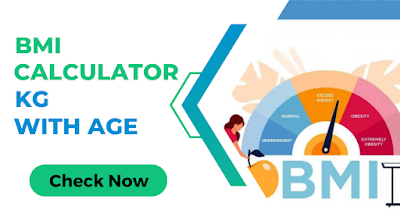BMI Calculator
Bmi Calculator Kg With Age
Welcome to our article on using a BMI calculator to track BMI, including age as a factor. Our main topic is Bmi Calculator Kg With Age.
What is BMI (Body Mass Index):
First, let's define BMI. BMI, or Body Mass Index, is a measure of body fat based on height and weight. It is used as an indicator of whether a person is at a healthy weight for their height.
Importance of tracking BMI:
It is important to track your BMI because it can be an indicator of your overall health. Being at a healthy weight can help reduce the risk of various health conditions such as heart disease, high blood pressure, and diabetes. On the other hand, being overweight or obese can increase the risk of these and other health problems.
In this article, we will be discussing the use of a BMI calculator to track BMI, including the role of age in the calculation. By using a BMI calculator, you can easily and accurately track your BMI and make informed decisions about your health and wellness. Keep reading to learn more about how to use a BMI calculator to track your BMI, including the role of age in the calculation.
How BMI is Calculated
BMI is calculated using the following formula:
BMI = weight (kg) / height (m)^2
The weight is measured in kilograms (kg) and the height is measured in meters (m). It is important to use the correct units when calculating BMI to ensure that the result is accurate.
Using the formula, we can calculate an individual's BMI by dividing their weight in kilograms by their height in meters squared. For example, if someone weighs 70 kg and is 1.75 meters tall, their BMI would be calculated as follows:
BMI = 70 kg / (1.75 m)^2
BMI = 70 kg / 3.06 m^2
BMI = 22.9
It is important to use the correct units when calculating BMI because the result can be significantly affected by using the wrong units. For example, if we used pounds and inches instead of kilograms and meters, the result would be different.
By understanding how to calculate BMI using the correct units, you can ensure that you are accurately tracking your BMI and making informed decisions about your health and wellness.
What is the Relationship Between Age and BMI:
Age can have an impact on an individual's BMI. As we age, our bodies naturally go through changes that can affect our weight and overall health.
It is important to track your BMI at different ages to get a complete picture of your health. Your BMI may vary at different ages due to factors such as changes in muscle mass, metabolism, and hormonal fluctuations.
For example, it is common for people to lose muscle mass as they age, which can lead to a decrease in BMI. On the other hand, some people may gain weight as they age due to a slower metabolism or other factors.
It is important to track your BMI at different ages to get a full understanding of how your body is changing over time. This can help you make informed decisions about your health and wellness.
In addition, it is important to note that different age groups have different BMI ranges for what is considered healthy. For example, a healthy BMI for a young adult may be different from a healthy BMI for an older adult. By tracking your BMI at different ages, you can ensure that you are in the healthy range for your age group.
By understanding the role of age in BMI, you can get a more complete picture of your health and make informed decisions about your wellness.
How To Using a BMI Calculator:
Using a BMI calculator can be a convenient and accurate way to track your BMI, including taking age into account.
There are many benefits to using a BMI calculator. It can save you time and effort by doing the calculations for you. It can also help you track your BMI more accurately, as it takes into account the correct units of measurement and factors such as age.
To use a BMI calculator, you will typically need to input your weight, height, and age. Some calculators may also ask for additional information such as gender. It is important to input this information accurately to ensure that the calculator gives you an accurate result.
There are many BMI calculators available online, and many of them are free to use. Simply search for "BMI calculator" and you will find a variety of options to choose from.
Here are some tips for using a BMI calculator effectively:
- Make sure to input your weight, height, and age accurately. This will ensure that the calculator gives you an accurate result.
- Use the calculator regularly to track your BMI over time. This can help you see how your BMI is changing and make informed decisions about your health and wellness.
- Use the calculator as a tool, not as a definitive answer. Your BMI is just one factor to consider when it comes to your overall health. It is important to also consider other factors such as your diet, exercise habits, and overall lifestyle.
By using a BMI calculator, you can easily and accurately track your BMI and make informed decisions about your health and wellness.
Conclusion:
In conclusion, tracking your BMI, including taking age into account, is an important part of maintaining your overall health and wellness.
Using a BMI calculator can be a convenient and accurate way to track your BMI. It can save you time and effort by doing the calculations for you, and it takes into account important factors such as age and the correct units of measurement.
We encourage you to use a BMI calculator to track your own BMI and make informed decisions about your health and wellness. Remember to also consider other factors such as your diet, exercise habits, and overall lifestyle when it comes to your overall health.
By tracking your BMI and making healthy lifestyle choices, you can take control of your health and live a happy and healthy life.
What foods cause high BMI?
There are many factors that can contribute to a high BMI (Body Mass Index). A measurement of body fat based on height and weight is called BMI. It is used as an indicator of whether a person is at a healthy weight for their height.
While a high BMI can be caused by a variety of factors, one of the main contributors is an unhealthy diet. Here are a few types of foods that may contribute to a high BMI:
- Processed and high-fat foods: Foods like chips, cookies, and fast food are often high in calories and unhealthy fats, which can lead to weight gain.
- Sugary drinks: Beverages like soda, sports drinks, and sweetened teas are high in added sugars and calories, which can contribute to weight gain.
- Alcohol: Alcoholic beverages can be high in calories, particularly if they are mixed with sugary mixers. Alcohol abuse can result in weight gain as well.
- Refined carbs: Foods like white bread, pasta, and rice are low in nutrients and can cause blood sugar spikes, which can lead to weight gain.
By avoiding these types of foods and focusing on a healthy, balanced diet, you can work towards lowering your BMI and improving your overall health. Remember to also focus on getting regular physical activity and maintaining a healthy lifestyle.
What foods lower your BMI?
Numerous foods can help you reduce your BMI (Body Mass Index). A measurement of body fat based on height and weight is called BMI. When determining a person's weight for height, it serves as a gauge.
Focusing on eating a healthy, balanced diet that is high in nutrients and low in calories will help you lower your BMI. Listed below are a few dietary categories that could aid in reducing your BMI:
- Fruits and vegetables: Which have a lot of fibre, which can make you feel satiated and full. They are a fantastic option for weight loss because they are low in calories.
- Lean proteins: Foods strong in protein, such as chicken, turkey, and tofu, can help you increase and maintain your muscle mass. Protein can also make you feel satiated and full.
- Whole grains: Fiber-rich foods like whole wheat bread, quinoa, and oats can make you feel satiated and full. They supply a lot of energy as well.
- Nuts and seeds: These foods might make you feel satiated and full because they are rich in protein and good fats. Just be mindful of your portion sizes because they might contain a lot of calories.
You may lower your BMI and enhance your general health by incorporating these kinds of foods into your diet. Do not forget to concentrate on keeping a healthy lifestyle and engaging in frequent physical activity.
How do you get your BMI down fast?
You can use a variety of methods to fast reduce your BMI (Body Mass Index), but it's vital to keep in mind that long-lasting lifestyle changes are the secret to long-term success. Here are some methods that could assist you in reducing your BMI:
- Consume a balanced diet that emphasises a range of healthful foods such fruits, vegetables, whole grains, and lean proteins. Stay away from processed and high-fat food.
- Get regular exercise: Aim for at least 75 minutes of strenuous exercise or 150 minutes of moderate exercise per week. This can aid in calorie burning and general health improvement.
- Water can help you feel full and can help you lose weight, so drink enough of it. Aim for 8 cups of water or more each day.
- Get enough rest; not getting enough sleep can result in weight gain. Sleep for 7-9 hours every night.
- Think about taking a supplement to aid in weight loss. Examples include protein powders and meal replacement shakes. However, before beginning any supplement programme, it's crucial to see a healthcare provider.
You can work on lowering your BMI and improving your general health by implementing healthy lifestyle choices. Remember to seek the counsel and direction of a healthcare expert as well.
Why is my BMI so high but I'm not fat?
There are several reasons why your BMI (Body Mass Index) may be high, even if you don't consider yourself to be fat. Here are a few potential explanations:
- Muscle mass: If you have a high muscle mass, your weight may be higher, which can result in a higher BMI. However, muscle tissue is denser than fat tissue, so it takes up less space. Therefore, even though your weight may be higher, you may not look or feel fat.
- Age: As we age, our bodies naturally go through changes that can affect our weight and overall health. For example, it is common for people to lose muscle mass as they age, which can lead to a decrease in BMI. On the other hand, some people may gain weight as they age due to a slower metabolism or other factors.
- Genetics: Your genes can play a role in your weight and overall health. Some people may have a higher BMI due to genetics, even if they eat a healthy diet and get regular physical activity.
- Other factors: There are many other factors that can affect your BMI, such as hormonal imbalances, medications, and underlying health conditions.
It is important to note that BMI is just one factor to consider when it comes to your overall health. It is always best





















0 Comments